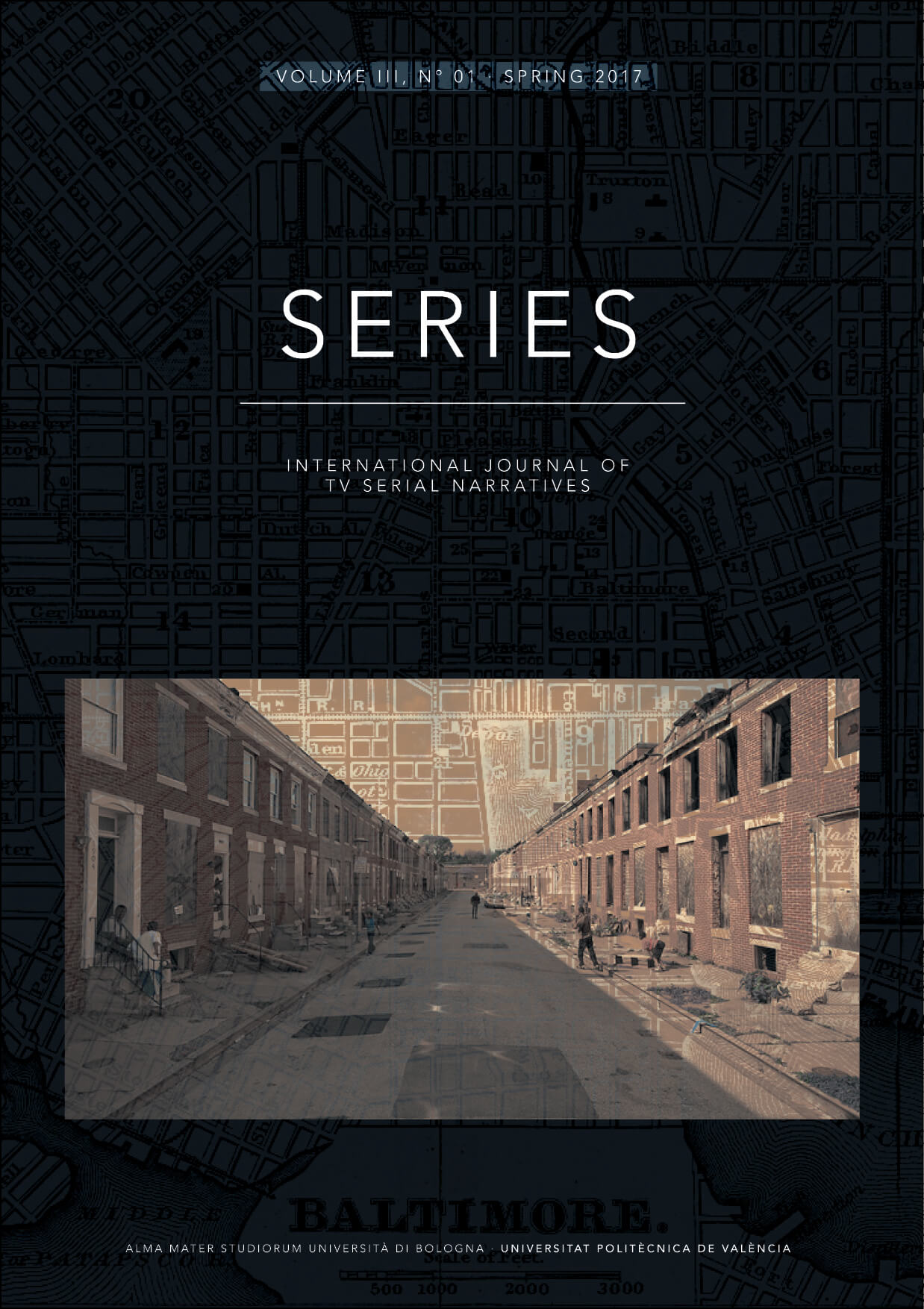Belfast in The Fall: Post-Conflict Geographies of Violence and Gender
DOI:
https://doi.org/10.6092/issn.2421-454X/7145Keywords:
The Fall, post-conflict, gender, Belfast, location studiesAbstract
This article examines the TV series The Fall in terms of the relationship to its location in the city of Belfast. Viewing the process of production and dramatization as intrinsically linked to aspects of the city from a post-conflict perspective, the paper examines how issues of onscreen violence and gender are worked out in this context of economic regeneration in operation since the 1998 Good Friday Agreement. The introduction of a fictional serial killer to the province after decades of violence and a fragile peace process can be seen as an attempt to normalize the region in the popular imagination. The paper firstly examines the various ways that the older geography and spatial markers of the city are incorporated into the series and characters. At times used by the director to add a sense of unresolved social tension and spectral presence of simmering violence, the city and its history provide a repressed background to the foregrounded conflict. This is examined further by framing the series as an example of third-wave Troubles drama where cultural production plays an important role in the stabilizing of this post-conflict society. Within the drama itself images of birth and the tenuous beginnings for future generations are configured around issues of gender, masculinity and unpredictable reactions to the opening up of Northern Irish society to forces of globalization. The paper reflects on how the series effectively intertwines issues of loss, grieving and fragile recovery in a place still not clear on how to deal with its recent history and the anxieties over the return of violence.References
Bauman, Zigmunt (2000). Liquid Modernity, Cambridge: Polity Press.
Cubitt, Allan (2013). “The Fall's writer Allan Cubitt on women and violence in TV drama”.The Guardian. https://www.theguardian.com/tv-and-radio/2013/jun/07/the-fall-allan-cubitt-women-violence (last accessed 07-07-17).
Gordon, Avery (2007). Ghostly Matters: Haunting and the Sociological Imagination, Minnesota: University Of Minnesota Press.
Hoewer, Melanie (2013). “Women, Violence, and Social Change in Northern Ireland and Chiapas: Societies Between Tradition and Transition.” International Journal of Conflict and Violence 7(2). DOI: 10.4119/UNIBI/ijcv.305.
Jermyn, Deborah (2016). “Silk blouses and fedoras: The female detective, contemporary TV crime drama and the predicaments of postfeminism.” Crime Media Culture: 1–18. DOI: 10.1177/1741659015626578.
Lambert, Gregg (2010). “The War-Machine and ‘a people who revolt’.” Theory & Event 13(3). DOI: 10.1353/tae.2010.0015.
Lukinbeal, Chris (2005). “Cinematic Landscapes.” Journal of Cultural Geography 23(1): 3-22. DOI: 10.1080/08873630509478229.
McKittrick, David. et al. (2004). Lost Lives: The Stories of the Men, Women and Children who Died as a Result of the Northern Ireland Troubles, Edinburgh: Mainstream Publishing
McLaughlin, Greg and Stephen Baker (2010). The Propaganda of Peace: The Role of Media and Culture in the Northern Ireland Peace Process Bristol: Intellect.
McLoone, Martin (2004). “Topographies of Terror and Taste: the Re-imagining of Belfast in Recent Cinema.” In Keeping it Real: Irish Film and Television, edited by Ruth Barton & Harvey O'Brien, 134-47. London: Wallflower
Moore, Robert (2016). “Rebranding Belfast: Chromatopes of (Post-) Conflict.” Signs and Society 4(1). DOI: 10.1086/684688.
Morrow, Duncan (2013). “Northern Ireland remains sharply divided over national identity but with no strong desire for Irish unity.” Belfast Telegraph. www.belfasttelegraph.co.uk/opinion/columnists/northern-ireland-remains-sharply-divided-over-national-identity-but-with-no-strong-desire-for-irish-unity-29332675.html (last accessed 07-07-17).
Meagher, Kevin (2016). “Truth and reconciliation? The reality is Northern Ireland will have neither.” New Statesman. http://www.newstatesman.com/politics/devolution/2016/01/truth-and-reconciliation-reality-northern-ireland-will-have-neither (last accessed 07-07-17).
Murtagh, Brendan. (2008). “New Spaces and Old in ‘Post-Conflict’ Belfast.” In Divided Cities/Contested States, Working Paper No.5. http://www.conflictincities.org/workingpaper05.html (last accessed 07-07-17).
Neill, J. V. William, Diana Fitzsimons and Brendan Murtagh (eds.) (1995). Reimaging the Pariah City: Urban Development in Belfast and Detroit, Aldershot: Avebury.
Ní Aoláin, Fionnuala (2009). “Gender, Masculinities and Transition in Conflicted Societies.”, New England Law Review, Forthcoming; Minnesota Legal Studies Research Paper No. 09-49. https://ssrn.com/abstract=1518541 (last accessed 07-07-17).
Northern Ireland Screen (n.d.), ‘About Us’. http://www.northernirelandscreen.co.uk/sections/76/about-us.aspx (last accessed 07-07-17).
Northover, Jim (2010). “A brand for Belfast: How can branding a city influence change?” Place Brand Public Diplomacy 6(2):104–11. DOI: 10.1057/pb.2010.9.
Roberts, Les (2016). “Landscapes in the Frame: Exploring the Hinterlands of the British Procedural Drama.” New Review of Film and Television Studies 14(3): 364-85. DOI: doi.org/10.1080/17400309.2016.1189712.
Seltzer, Mark (1998). Serial Killers: Death and Life in America's Wound Culture, London: Routledge.
Seth-Smith, Niki (2014). “The Fall: Extreme Violence as a Distorted Mirror of Post-Conflict Belfast.” https://www.opendemocracy.net/5050/niki-sethsmith/fall%e2%80%99s-extreme-violence-is-distorted-mirror-of-postconflict-northern-ireland (last accessed 07-07-17).
Shirlow, Peter (2006). “Belfast: The Post-Conflict City.” Space and Polity 10(2), 99–107. DOI: doi.org/10.1080/13562570600921451.
Steenberg, Lindsay (2017). “The Fall and Television Noir.” Television & New Media 18(1), 58–75.
Women’s Aid (n.d.). “Domestic Violence Statistics. PSNI Statistics for 2014/15.” http://www.womensaidni.org/domestic-violence/domestic-violence-statistics/ (last accessed 07-07-17).
TV Shows and Films cited
Bloody Sunday (2002)
The Fall (2013-2016)
Hunger (2008)
I am Belfast (2015)
Resurrection Man (1998)
Sunday (2002)
Downloads
Published
How to Cite
Issue
Section
License
Copyright (c) 2017 John Lynch
Copyrights and publishing rights of all the texts on this journal belong to the respective authors without restrictions.
This journal is licensed under a Creative Commons Attribution 4.0 International License (full legal code).
See also our Open Access Policy.





